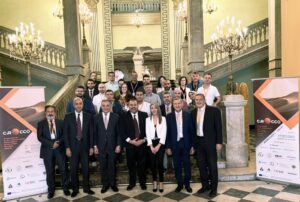{youtube}0ByQ7dqrW-M{/youtube}
Cluster 5, comprised of ICCS, OCEAN, INSB and SEABILITY focused on the life cycle of small craft passenger boats that are made of composite materials. Passenger boats (small craft, with length overall up to 30m) are sea-going vessels which carry passengers for recreational purposes. For example small charter cruises, for the purposes of scheduled routes or transportation of professional personnel or ship crews. A user-friendly, dynamic, information-rich technical meta-file was developed for the vessel that includes all aspects of the vessel including; initial customer specifications, required regulations, shipyard designs, final sea-trial data and post-delivery surveys and inspections.
Here is a really interesting story:
Ocean Shipyard is a family-run business whose history can be traced back almost a hundred years. The father and grandfather of Vassilis Stratis founded Ocean and started out supplying small wooden fishing boats to fishermen in Northern Greece. Vassilis now works with his father in a state of the art shipyard just outside Athens in Greece, supplying a range of vessels, from passenger boats for the tourism industry, to boats for personal and recreational use, as well as industrial and professional uses.
Vassilis and the team at Ocean have responded to changing customer and shipping industry demands in Greece, and at European and international levels. Customers such as tourism operators, fishermen and transport companies want boats that are lighter, faster and cost less to run, while safety requirements and shipping regulations change regularly.
As Vasillis says:
“Ships are high-investment products with a lifespan of 30 years, ship owners don’t want to just throw their ships away. They upgrade them to meet new business or regulation requirements. The shipbuilding industry is heavily regulated for safety reasons”
This requires the ability to innovate in order respond quickly in a changing business environment. Not only is there a need to adapt to new trends and tastes in ship building, but more vessel owners are looking to repurpose ships that no longer fit the bill in a business sense. For example, many fishermen are repurposing fishing boats to become tourism boats to meet the rising tide of Greek tourism.
Collaboration has proven to be the key to finding creative and practical solutions to these challenges. Vassilis, in Ocean shipyard, is working with Use-It-Wisely partners SEAbility (a shipping agent company) INSB (the Greek Naval Classification Society) and ICCS (The Greek Institute of computerScience) to test out different scenarios using data from their respective sectors of the shipping industry.
Eric Cauchi from SEAbility is very positive about this collaboration and says that his company now has a “better understanding of our own business processes as well as undeveloped opportunities” thanks to Use-It-Wisely collaboration.
This expert team have developed two original desktop computer apps to maximise operational capacity for tourism, fishing and industry vessels, therefore reducing overall costs for businesses. Through clever business modelling the team have also discovered how to extend the lifetime of these vessels, allowing them to be upgraded or repurposed during their typical 30 year lifespan. Remanufacturing is an increasingly important consideration for industry. Extending the lifecycle of high investment products contributes to the closed loop ideals of the circular economy-reusing products and materials rather than discarding of them.
The “Vessel Metafile” app will make it easier for shipyards, classification societies and ship owners to communicate when it comes to data management, workflow management and seaworthiness inspections. Currently, the three partners communicate individually, each using separate copies of the substantial documents and files they need. The Vessel Metafile app will improve communications and efficiency by handling communications and data management from a single source. The app also allows this trio to run different simulations in order to find optimal specifications for a particular vessel and its use. This ensures optimal use and function, and minimal waste and downtime.
The “Requirements Configuring Tool” app will communicate specifications required by various classification societies to ship owners and shipyards the. The requirements will be communicated to ship owners in advance to optimise time efficiency. This app modernises a large part of the ship building process, reduces time in communication between the different actors and increases efficiencies for everyone involved.
Vassilis says that these computer apps …
“… facilitate collaboration and support decision making. They improve understanding of the systems and requirements, and optimise ways of working for all partners.”
Together, these computer apps can decrease costs in shipbuilding, increase the lifespan of vessels and reduce lead times in shipbuilding by 20%.






